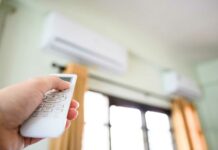A clogged air filter could add $82 to your annual electric bill. Checking, changing or cleaning the filter monthly saves money and extends the life of your home’s heating, ventilation and air conditioning (HVAC) system.
Over one-half of your monthly energy bill goes toward keeping your home comfortable. Air filters prevent dust and allergens from clogging the HVAC system, so leaving a filter unchecked builds up dirt and reduces air quality while forcing the system to work harder. This results in higher energy bills and potential system failure.
Air filters live in duct system slots or the return grilles of central air conditioners, furnaces and heat pumps. The U.S. Department of Energy (DOE) advises replacing the filter at least every three months, and especially before heavy-use seasons like summer and winter. If you live with pets or smokers, filters clog more quickly. Remodeling projects or furniture sanding also add more dirt, so a filter may need to be changed sooner.
Before checking the filter, turn the HVAC system off, slide the filter out, and look for layers of hair and dirt. Run a finger across the filter-if it comes away dirty or there’s a line left on the filter, it’s time to change. When replacing it, make sure the arrow on the filter showing the airflow direction points toward the blower motor. Write the date on the filter so you know when it needs checking again. After the change, turn the system back on.
Write down the size printed on the current filter before buying a new one. A too-small filter lets dirt get around the barrier and invade your system.
There are different types of filters and efficiency. They are either flat or pleated, but the pleated are most efficient because they have extra area to hold dirt.
The most common have layered fiberglass fibers reinforced with metal grating, but some boost efficiency by using polyester. Electrostatic filters are made from positively- and negatively-charged fibers and capture smaller debris—the charge actively pulls particles from the air like iron filings onto a magnet. No power connection is required, and the charge doesn’t fade over time. Filters that best capture small debris are high-efficiency particulate arrestance (HEPA) filters, but are used mainly in hospitals and office buildings.
Air filters are rated from one to 20 (see chart) by a Minimum Efficiency Reporting Value (MERV) that gauges how well they block debris. A MERV 6 or higher is recommended.
Manufacturers are not required to post the MERV on packaging. Brands like 3M’s Filtrete® instead list microparticle performance ratings, with higher numbers meaning it catches more particles. Home Depot’s Air Filter Performance Rating system ranks by good, better, best and premium. Whichever system is used, better filters mean higher MERV scores. For allergy sufferers, a high-MERV filter keeps out excess dander, smoke and other allergens.
Before summer, clean the cooling system coils inside and outside your home. Leaves, dirt and debris that gathers around the air conditioner in fall and winter can keep the coils from operating efficiently, which shortens the unit’s lifespan and increases cooling bills.
Blocked vents can also strain your HVAC system. Clean air registers, baseboard heaters and radiators, and make sure air ducts are not blocked by furniture, rugs or window treatments.
-Megan McKoy-Noe





